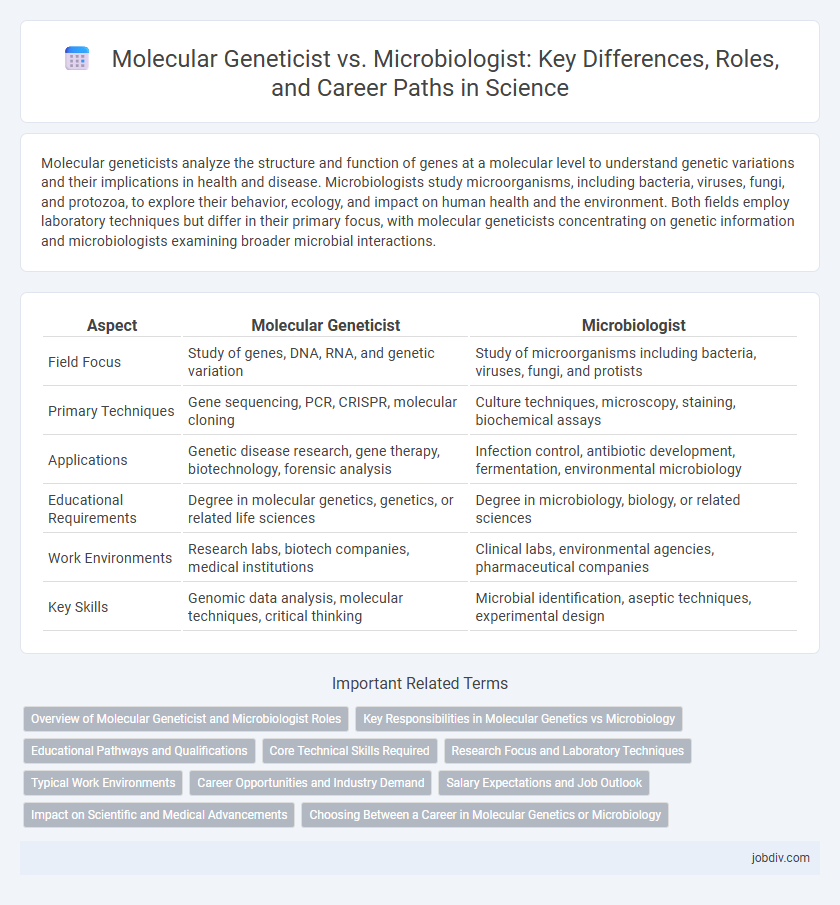Molecular geneticists analyze the structure and function of genes at a molecular level to understand genetic variations and their implications in health and disease. Microbiologists study microorganisms, including bacteria, viruses, fungi, and protozoa, to explore their behavior, ecology, and impact on human health and the environment. Both fields employ laboratory techniques but differ in their primary focus, with molecular geneticists concentrating on genetic information and microbiologists examining broader microbial interactions.
Table of Comparison
| Aspect | Molecular Geneticist | Microbiologist |
|---|---|---|
| Field Focus | Study of genes, DNA, RNA, and genetic variation | Study of microorganisms including bacteria, viruses, fungi, and protists |
| Primary Techniques | Gene sequencing, PCR, CRISPR, molecular cloning | Culture techniques, microscopy, staining, biochemical assays |
| Applications | Genetic disease research, gene therapy, biotechnology, forensic analysis | Infection control, antibiotic development, fermentation, environmental microbiology |
| Educational Requirements | Degree in molecular genetics, genetics, or related life sciences | Degree in microbiology, biology, or related sciences |
| Work Environments | Research labs, biotech companies, medical institutions | Clinical labs, environmental agencies, pharmaceutical companies |
| Key Skills | Genomic data analysis, molecular techniques, critical thinking | Microbial identification, aseptic techniques, experimental design |
Overview of Molecular Geneticist and Microbiologist Roles
Molecular geneticists analyze DNA and RNA sequences to understand genetic diseases, mutations, and gene functions, using techniques like PCR and gene editing. Microbiologists study microorganisms such as bacteria, viruses, and fungi to investigate their behaviors, environmental roles, and impacts on human health. Both roles involve laboratory research but differ in focus, with molecular geneticists centered on genetic material and microbiologists on microbial organisms.
Key Responsibilities in Molecular Genetics vs Microbiology
Molecular geneticists focus on analyzing DNA, RNA, and genetic mutations to understand hereditary diseases and develop gene therapies, often using techniques like PCR and CRISPR. Microbiologists study microorganisms such as bacteria, viruses, and fungi to investigate infection mechanisms, antibiotic resistance, and environmental impacts, employing culturing and microscopy methods. Both roles require expertise in laboratory experimentation and data analysis, but molecular geneticists emphasize genetic material manipulation while microbiologists focus on microbial physiology and ecology.
Educational Pathways and Qualifications
Molecular geneticists typically require a PhD in molecular genetics, genetics, or a related field, emphasizing advanced coursework in DNA/RNA analysis, gene editing technologies, and bioinformatics. Microbiologists often hold a bachelor's or master's degree in microbiology, biology, or biotechnology, focusing on microbial physiology, pathogenic microbiology, and laboratory techniques. Both careers demand extensive laboratory experience and proficiency in molecular biology methods, but molecular geneticists pursue deeper specialization in genetic manipulation and genomics.
Core Technical Skills Required
Molecular geneticists require proficiency in DNA sequencing, polymerase chain reaction (PCR), and gene editing technologies such as CRISPR, enabling detailed analysis of genetic material and manipulation of genomes. Microbiologists must master aseptic techniques, microbial culture methods, and microscopy to study microorganisms' physiology and interactions effectively. Both disciplines demand expertise in bioinformatics and data analysis software for interpreting complex biological datasets.
Research Focus and Laboratory Techniques
Molecular geneticists specialize in studying gene structure, function, and heredity using techniques like PCR, DNA sequencing, and gene editing tools such as CRISPR-Cas9 to explore genetic variations and mutations. Microbiologists focus on understanding microorganisms, including bacteria, viruses, fungi, and protozoa, employing techniques like culture methods, microscopy, and antimicrobial susceptibility testing to investigate microbial behavior and interactions. Both fields utilize molecular biology methods but differ in organism focus, with molecular geneticists targeting genetic material and microbiologists emphasizing microorganism physiology and ecology.
Typical Work Environments
Molecular geneticists typically work in advanced research laboratories, universities, and biotechnology companies, analyzing DNA sequences and genetic information to understand gene functions and variations. Microbiologists often conduct their work in clinical labs, pharmaceutical companies, and environmental agencies, focusing on studying microorganisms such as bacteria, viruses, and fungi to develop vaccines and antibiotics. Both professions involve extensive laboratory work but differ in their specific research environments and biological subjects.
Career Opportunities and Industry Demand
Molecular geneticists specialize in analyzing genetic material to understand hereditary diseases and develop gene therapies, with growing demand in biotechnology, pharmaceuticals, and personalized medicine sectors. Microbiologists focus on studying microorganisms and their interactions, offering robust career opportunities in public health, environmental science, and industrial microbiology. Both fields experience strong industry demand, driven by advancements in genetic research and the need for microbial solutions in healthcare and environmental management.
Salary Expectations and Job Outlook
Molecular geneticists typically earn higher salaries, with median annual wages around $84,810, reflecting specialized skills in DNA analysis and gene manipulation, whereas microbiologists average about $75,650 per year, focusing on microorganisms' behavior and applications. Job growth projections from the Bureau of Labor Statistics indicate a 5% increase for molecular geneticists and a slightly higher 6% for microbiologists over the next decade, driven by advancements in biotechnology and healthcare. Demand for molecular geneticists is particularly strong in genetic research and personalized medicine, while microbiologists find opportunities in pharmaceuticals, environmental science, and food safety sectors.
Impact on Scientific and Medical Advancements
Molecular geneticists drive scientific and medical advancements through their expertise in gene manipulation, enabling breakthroughs in personalized medicine and genetic therapies for hereditary diseases. Microbiologists contribute by studying microorganisms that affect human health, leading to the development of vaccines, antibiotics, and infection control strategies. Both fields are critical in combating infectious diseases and advancing biotechnology, but molecular genetics focuses more on genetic basis and manipulation, while microbiology centers on microbial physiology and pathology.
Choosing Between a Career in Molecular Genetics or Microbiology
Choosing a career in molecular genetics offers opportunities to explore DNA sequencing, gene editing technologies like CRISPR, and personalized medicine advancements, while microbiology emphasizes studying microorganisms' roles in infection control, biotechnology, and environmental impact. Molecular geneticists often work in genomics research, pharmaceutical development, and clinical diagnostics, whereas microbiologists focus on pathogen identification, antibiotic resistance, and industrial microbiology applications. Both fields demand strong analytical skills and laboratory proficiency but differ in their primary research subjects and applied methodologies.
Molecular Geneticist vs Microbiologist Infographic

 jobdiv.com
jobdiv.com